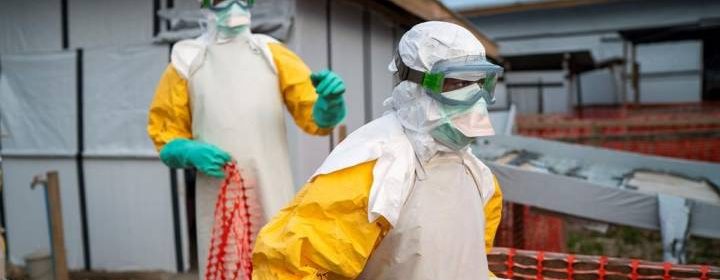Congo Ebola outbreak, one year in: What you need to know about the crisis

One year ago, four Ebola cases appeared in the town of Mangina in the Democratic Republic of Congo.
Since then, it’s spread across the region, worrying global health officials. In July, the World Health Organization called the crisis an “international health emergency of global concern.”
Here’s what you need to know about the ongoing outbreak.
How many people have been infected?
Related
 Second person dies of Ebola in major Congolese city
Second person dies of Ebola in major Congolese city
 Here’s a timeline on how an Ebola outbreak in Congo became a global concern
Here’s a timeline on how an Ebola outbreak in Congo became a global concern
As of July 29, 2019, 2,687 people have been infected with the virus. Of those, 1,803 have died, many of them children.
A handful of cases have been in neighbouring Uganda.
The virus causes fever, intense weakness, muscle pain, headaches and sore throat at first. This can progress to vomiting, diarrhea, impaired kidney and liver function and, in some cases, internal and external bleeding, according to the WHO.
In past outbreaks, death rates have varied from 25 to 90 per cent of those infected.
People usually catch Ebola either by butchering and eating infected animals, or by coming into contact with the bodily fluids of infected people, according to the WHO. Bodily fluids left on items like soiled clothing or bedding can also infect people if their broken skin contacts the fluid.
Is it spreading?
So far, the outbreak has mostly remained confined to the eastern part of Congo, with the exception of those few Uganda cases. Still, in a recent update, the WHO said that while the global risk is low, the risk of regional spread is “very high.”
That’s partly because of a relatively new development: three cases have been found in the city of Goma, which has a population of around two million people — about the same size as the city of Montreal.
It’s also a major regional trade and transit hub, right on the Rwandan border, meaning lots of people go in and out.
The most recent case is the one-year-old daughter of a man who died of the infection just a few days ago — meaning he transmitted the virus within the city. Officials are hunting for other cases, but finding everyone he came into contact with may be tricky as the man took taxis through the region and stayed at home sick for days before going to a health facility.
There are conflicting reports that Rwanda may have closed its borders near Goma on Thursday. If the border was closed, this goes against the WHO’s advice a week earlier to keep international trade flowing. Many people travel between Congo and Rwanda every day for work.
Why is it so hard to fight?
There are experimental vaccines that seem to protect against Ebola, and health-care workers in Congo, Rwanda and Uganda have been getting their shots in case they come into contact with the disease.
One of the biggest problems, though, has been the security situation. Health-care workers have been attacked and even killed. The region is beset by militia violence, and people in the area are wary of outsiders and mistrust health workers. There have been at least 198 attacks on health workers and health care facilities since January.
Many people in the region don’t believe the virus is real, health workers have said.
It’s been called a health emergency. What does that mean?
When the WHO declared the Ebola outbreak a public health emergency of international concern in mid-July, this was a way of highlighting the potential risk of spread to other countries as well as the need for a co-ordinated international response.
It also means the WHO would offer Congo additional support, possibly make recommendations on how to deal with the problem and ask the international community to pitch in.
The declaration brought a surge of millions of dollars in new pledges by international donors, according to a report from the Associated Press.
Why should we care?
Hundreds of people have died so far, with many more at risk. The outbreak is causing suffering and fear in areas that it’s touched.
Containing the outbreak is important, too. As it spreads to more populated areas, the virus is more and more likely to explode into a much larger crisis.
—With files from Reuters and the Associated Press
Sign up for our Health IQ newsletter
© 2019 Global News, a division of Corus Entertainment Inc.
Source: Read Full Article

